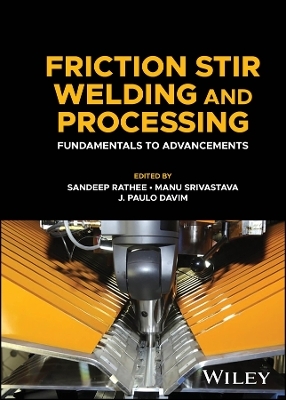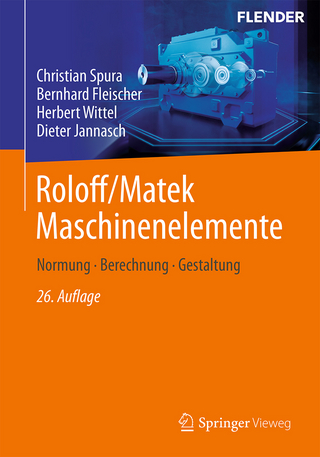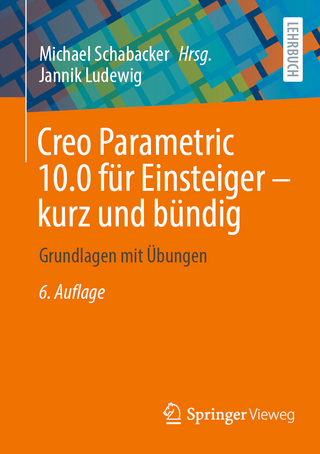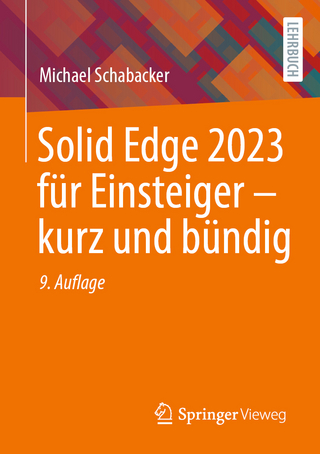
Friction Stir Welding and Processing
John Wiley & Sons Inc (Verlag)
978-1-394-16943-6 (ISBN)
Friction Stir Welding and Processing: Fundamentals to Advancements provides concise yet comprehensive coverage of the field of friction stir welding, with an eye toward future research directions and applications. Throughout the book, case studies provide real-world context and highlight applications for various engineering sectors. With contributions from an array of leaders in the field, Friction Stir Welding and Processing provides readers with a single source of information on all aspects of FSW and FSP.
After explaining the fundamentals of friction stir welding (FSW) and its variants, the book discusses composite fabrication techniques using friction stir processing (FSP). Different types of friction techniques are covered, as is the equipment used. Detailed characterization of samples and composites are included. Additional topics discussed include the impact of FSW on the economics of production, methods for coupling FSW/FSP with additive manufacturing, composite fabrication, and process-property relationships.
Master the basic concepts of friction stir welding and its variants
Discover the role of FSW in developing hybrid manufacturing techniques
Follow case studies that connect theoretical concepts to real-world experimental results
Learn from contributions from an array of global thought leaders in the field
This is a valuable compendium on the topic for engineers and designers who utilize welding and advanced manufacturing across industries, as well as graduate students and post-graduate researchers who are exploring new friction stir welding applications.
Sandeep Rathee, PhD, is an Assistant Professor in the Department of Mechanical Engineering at the National Institute of Technology, Srinagar, India. His research interests include friction stir welding/processing, additive manufacturing, composites, and hybrid manufacturing. Manu Srivastava, PhD, is an Assistant Professor in the Department of Mechanical Engineering at the PDPM Indian Institute of Information Technology, Design and Manufacturing, Jabalpur, India. Her research interests include additive manufacturing, friction-based AM, friction stir processing, advanced materials, manufacturing practices, and optimization techniques. J. Paulo Davim, PhD, is a Professor at the University of Aveiro, Portugal and a Fellow (FIET) of the Institution of Engineering and Technology, UK. His research interests include advanced manufacturing methods and materials.
About the Editors xv
List of Contributors xviii
Preface xxv
Acknowledgements xxix
List of Figures xxx
List of Tables xl
1 Friction Stir Welding: An Overview 1
Farooz A. Najar, Shazman Nabi, Sandeep Rathee, and Manu Srivastava
1.1 Introduction 1
1.2 FSW Working Principle 2
1.3 Weld Zones 3
1.4 Variants of FSW 4
1.5 Defects 10
1.6 Advantages and Limitations of FSW 11
1.7 Conclusion and Future Prospectus 12
Acknowledgments 12
References 12
2 Friction Stir Welding and Single-Point Incremental Forming: State-of-the-Art 15
Hitesh Mhatre, Amrut Mulay, and Vijay Gadakh
2.1 Introduction 15
2.2 Friction Stir Welding (FSW) 16
2.3 Single-Point Incremental Forming (SPIF) 18
2.4 FSW and SPIF 21
2.5 Summary and Outlook 22
References 23
3 Friction Stir Brazing and Friction Stir Vibration Brazing 25
Behrouz Bagheri and Mahmoud Abbasi
3.1 Introduction to FSB 25
3.2 Variants of FSB 26
3.3 Two Case studies 27
3.4 Application of FSB and Its Variants in Industry 35
3.5 Summary and Future Directions 35
References 36
4 Fundamentals of Friction Stir Processing 39
Atul Kumar, Devasri Fuloria, Manu Srivastava, and Sandeep Rathee
4.1 Friction Stir Processing (FSP): Background 39
4.2 Working Principle of FSP 39
4.3 Comparison with Other Severe Plastic Deformation (SPD) Techniques 42
4.4 Process Variables 43
4.5 Mechanisms of Microstructural Evolution During FSP 48
4.6 Critical Issues in FSP 49
4.7 Future Scope 50
References 51
5 Role of FSP in Surface Engineering 55
Setu Suman and Kazi Sabiruddin
5.1 Introduction 55
5.2 Role of Surface Modification Techniques 56
5.3 Thermal Spray Technique 57
5.4 FSP – Solid-State Coating Process 58
5.5 Process Parameters of FSP: Surface Engineering 60
5.6 Inappropriate Characteristics of Surface Modification 61
5.7 Summary 63
References 64
6 Surface Composite Fabrication Using FSP 67
Baidehish Sahoo, Jinu Paul, and Abhishek Sharma
6.1 Introduction 67
6.2 Reinforcement Incorporation Approaches 68
6.3 Effect of Process Parameters 71
6.4 Microstructural Evolution and Mechanical Properties 75
6.5 Strengthening Mechanisms 80
6.6 Defects 83
6.7 Summary and Future Directions 86
References 86
7 Friction Stir Welding of Dissimilar Metals 93
Narayan Sahadu Khemnar, Yogesh Ramrao Gunjal, Vijay Shivaji Gadakh, and Amrut Shrikant Mulay
7.1 Introduction 93
7.2 Application Areas of Dissimilar Material Joining 94
7.3 Issues for Dissimilar Material Joining 94
7.4 FSW of Dissimilar Materials 95
7.5 Recent Developments in Tool Design and Tool Materials 103
7.6 Parameter Optimization 103
7.7 Common Defects that Occur in FSW of Dissimilar Metal Joining 104
7.8 Future Recommendations for Dissimilar Metal Joining 105
Acknowledgments 105
References 106
8 Friction Stir Welding of Aluminum and Its Alloy 109
Palani Sivaprakasam, Kolar Deepak, Durairaj Raja Joseph, Melaku Desta, Putti Venkata Siva Teja, and Murugan Srinivasan
8.1 Introduction 109
8.2 Fundamentals of FSW 110
8.3 FSW of Aluminum and Its Alloy 110
8.4 Influences of Process Parameters 112
8.5 Testing and Characterization of FSW of Al and Its Alloy 115
8.6 Additive Mixed Friction Stir Process of Al and Its Alloy 118
8.7 Applications 118
8.8 Conclusions 119
References 119
9 Mechanical Characterization of FSWed Joints of Dissimilar Aluminum Alloys of AA 7050 and AA6082 125
Mohd Sajid, Gaurav Kumar, Husain Mehdi, and Mukesh Kumar
9.1 Introduction 125
9.2 Materials and Methods 126
9.3 Results and Discussion 127
References 131
10 Sample Preparation and Microstructural Characterization of Friction Stir Processed Surface Composites 135
Manu Srivastava, Sandeep Rathee, Shazman Nabi, and Atul Kumar
10.1 Introduction 135
10.2 Sample Preparation for Microscopic Analysis of Metals, Alloys, and Composites 136
10.3 Etching 140
10.4 Microstructural Evolution 141
Acknowledgment 146
References 146
11 Microstructural Characterization and Mechanical Testing of FSWed/FSPed Samples 149
Prem Sagar, Sushma Sangwan, and Mohankumar Ashok Kumar
11.1 Introduction 149
11.2 Microstructural Characterization 152
11.3 Mechanical Testing 159
11.4 Conclusions 162
References 162
12 Comparative Analysis of Microstructural and Mechanical Characteristics of Reinforced FSW Welds 165
Tanvir Singh
12.1 Introduction 165
12.2 Friction Stir Welding (FSW) 166
12.3 Reinforcing Materials-Based Fabrication of FSW Welds 167
12.4 Joinability of Reinforced FSW Welds 168
12.5 Metallurgical Characteristics of FSW Reinforced Welds 169
12.6 Mechanical Behavior of Reinforced FSW Welds 179
12.7 Conclusions 184
12.8 Future Challenges 184
References 185
13 Summary of Efforts in Manufacturing of Sandwich Sheets by Various Joining Methods Including Solid-State Joining Method 193
Divya Sachan, R. Ganesh Narayanan, and Arshad N. Siddiquee
13.1 Introduction 193
13.2 Sandwich Sheets 193
13.3 Classification of Sandwich Sheet Structures 194
13.4 Applications 195
13.5 Fabrication Methods 196
13.6 Summary 200
References 201
14 Defects in Friction Stir Welding and its Variant Processes 205
Vinayak Malik and Satish V. Kailas
14.1 Introduction 205
14.2 General Defects in FSW 205
14.3 Characteristic Defects in Friction Stir Butt and Lap Joints 208
14.4 Distinctive Defects in Major Friction Stir Variants 209
14.5 Solutions to Avoid Defects in Friction Stir-Based Processes 212
14.6 Summary and Concluding Remarks 213
Acknowledgment 213
References 213
15 Nondestructive Ultrasonic Inspections, Evaluations, and Monitoring in FSW/FSP 215
Yuqi Jin, Teng Yang, Narendra B. Dahotre, and Tianhao Wang
15.1 Introduction 215
15.2 Ultrasonic Wave Behaviors in FSWed/FSPed Samples 215
15.3 Common Ultrasonic Inspection and Evaluation Methods for FSWed/FSPed Samples 224
15.4 Case Studies on Recent Novel Ultrasound Evaluation and Monitoring in FSW/FSP 234
15.5 Roles and Potentials of Ultrasound in Future FSW/FSP 242
15.6 Conclusion 243
Acknowledgment 243
References 243
16 Applications of Friction Stir Welding 245
Raja Gunasekaran, Velu Kaliyannan Gobinath, Kandasamy Suganeswaran, Nagarajan Nithyavathy, and Shanmugam Arun Kumar
16.1 Introduction 245
16.2 Application of FSW on Different Materials 247
16.3 Industrial Applications of FSW 252
16.4 Conclusion 255
References 256
17 Equipment Used During FSP 259
Kandasamy Suganeswaran, Nagarajan Nithyavathy, Palaniappan Muthukumar, Shanmugam Arunkumar, and Velu Kaliyannan Gobinath
17.1 Introduction 259
17.2 FSP Experimental Setup 264
17.3 Microstructural Characterization 267
17.4 Mechanical Behavior of Composites Based on Various Tool Shapes 271
17.5 Mechanical behavior of Composites Based on Various Process Parameters 272
17.6 Conclusion 273
References 273
18 Analysis of Friction Stir Welding Tool Using Various Threaded Pin Profiles: A Case Study 275
Bommana B. Abhignya, Ashish Yadav, Manu Srivastava, and Sandeep Rathee
18.1 Introduction 275
18.2 Geometry Considered 277
18.3 Results and Discussions – Analysis in ANSYS 278
18.4 Conclusion 279
Acknowledgement 281
References 281
19 Static Structural and Thermal Analysis of Honeycomb Structure Fabricated by Friction Stir Processing Route: A Case Study 283
Nikhil Jaiswal, Umashankar Bharti, Ashish Yadav, Manu Srivastava, and Sandeep Rathee
19.1 Introduction 283
19.2 Modeling Details 284
19.3 Result and Analysis 286
19.4 Scope of the Case Study 290
19.5 Conclusion 291
Acknowledgement 292
References 292
20 Friction Stir-Based Additive Manufacturing 293
Ardula G. Rao and Neelam Meena
20.1 Additive Manufacturing: An Introduction 293
20.2 Solid-State AM Processes 295
20.3 Case Studies of FSAM on Different Materials 299
20.4 Advantages of FSAM Over Other AM Techniques 300
20.5 Advancements 301
20.6 Limitations 302
20.7 Conclusions and Future prospectives 303
References 303
Index 307
| Erscheinungsdatum | 28.02.2024 |
|---|---|
| Verlagsort | New York |
| Sprache | englisch |
| Gewicht | 975 g |
| Themenwelt | Technik ► Maschinenbau |
| ISBN-10 | 1-394-16943-4 / 1394169434 |
| ISBN-13 | 978-1-394-16943-6 / 9781394169436 |
| Zustand | Neuware |
| Informationen gemäß Produktsicherheitsverordnung (GPSR) | |
| Haben Sie eine Frage zum Produkt? |
aus dem Bereich


